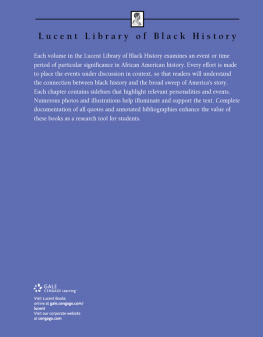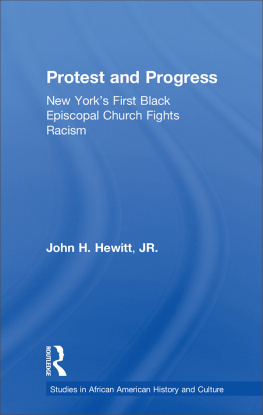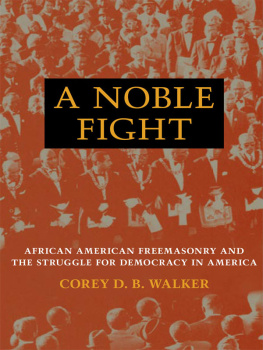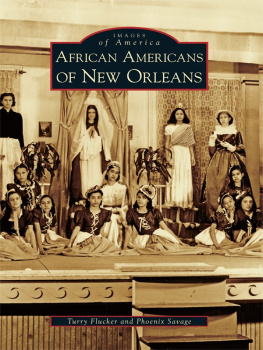Thank you for buying this ebook, published by NYU Press.
Sign up for our e-newsletters to receive information about forthcoming books, special discounts, and more!
Sign Up!
About NYU Press
A publisher of original scholarship since its founding in 1916, New York University Press Produces more than 100 new books each year, with a backlist of 3,000 titles in print. Working across the humanities and social sciences, NYU Press has award-winning lists in sociology, law, cultural and American studies, religion, American history, anthropology, politics, criminology, media and communication, literary studies, and psychology.
In the Company of Black Men
NEW YORK UNIVERSITY PRESS
New York and London
2001 by New York University
All rights reserved.
Library of Congress Cataloging-in-Publication Data
Wilder, Craig Steven.
In the company of Black men : the African influence on African
American culture in New York City / Craig Steven Wilder.
p. cm.
Includes bibliographical references (p. ) and index.
ISBN 0-8147-9368-1 (cloth : alk. paper)
1. African American menNew York (State)New YorkSocial
life and customs. 2. African American menNew York (State)
New YorkSocieties, etc. 3. VoluntarismNew York (State)
New YorkHistory. 4. African American menNew York (State)
New YorkReligion. 5. Black nationalismNew York (State)
New YorkHistory. 6. African AmericansNew York (State)
New YorkRelations with Africans. 7. Africa, WestCivilization.
8. Africa, WestReligious life and customs. 9. New York (N.Y.)
Civilization. 10. United StatesCivilizationAfrican influences.
I. Title
F128.9.N4 W55 2001
305.388960730747dc21 2001002836
New York University Press books are printed on acid-free paper,
and their binding materials are chosen for strength and durability.
Manufactured in the United States of America
10 9 8 7 6 5 4 3 2 1
Acknowledgments
I had some initial setbacks getting my first book to the public, and I am pleased to see that it has done well despite those early complications. I had left its final processing to its publishers while I dealt with an immediate personal concern: for a second time, a member of my family was suffering from schizophrenia. The loved ones of mentally ill people will wear some personal, emotional, and even professional scars, but these diseases reserve their greatest damage for those who directly suffer them. Over our lifetimes we will likely have a chance to realize a few of our dreams; however, mental illness will humble their endeavors and ambitions, distort their social lives, and threaten their personal bonds.
If fortunate, families like mine witness extraordinary exercises of human will. For instance, for the past several years, my oldest sister has struggled to control and conquer a disease that wants to destroy the basis of her person and erode the relationships that give life meaning. In a selfless expression of love, she has fought to maintain herself as a mother, sister, aunt, and friend. Her example has given us all the courage to confront the greater and lesser challenges of life.
Along the way, my family has enjoyed the support of many friends, and I have benefited from the generosity of many colleagues. My undergraduate and graduate mentors have been a well of comfort. Our relationships have evolved far beyond our professional ties. Writing this book has been a labor of pure enjoyment, and I think it appropriate that people who have so completely influenced my adult life share the dedication.
My romance with the African societies of Manhattan and Brooklyn began in the fall of 1991, when I rediscovered the New York African Society for Mutual Relief (NYASMR) papers while doing research in the library of Long Island University in Brooklyn. In 1945 the NYASMR folded and its records were abandoned in the Brooklyn Eagle Warehouse. A private collector took the papers after the facility was scheduled for demolition. They were later donated to LIU. I first used the collection to teach undergraduates to do primary research, and in the process I became quite familiar with the association and its members. I decided to write a history of the organization similar to one that Arthur Schomburg had proposed earlier this century. The structure of the book has changed significantly since then, but the desire to pay tribute to this important organization has remained. Following a lecture I gave on the NYASMR collection, the Schomburg Center for Research in Black Culture at the New York Public Library began microfilming the documents.
A few years ago, Niko Pfund, then editor-in-chief at New York University Press, contacted me about this work. His enthusiasm never waned. I also thank Eric Zinner, who inherited this undertaking, for his continued commitment to the project.
My colleagues at Williams College have formed a loud and much needed Amen Corner.
The Ford Foundation funded the final revision of this book through the Schomburg Center for Research in Black Cultures Scholars-in-Residence Program. I extend my thanks to my Schomburg classmatesLeslie Maria Harris, Margaret Rose Vendryes, Martha Elizabeth Hodes, Jeffrey Stewart, Carolyn Anderson Brown, and Debra Walker Kingfor a raucous and productive tenure. Colin Palmer and Zita Nunes brought intellectual direction to the program and Diana Lachatanere and Aisha al-Adawiya administered it with care and enthusiasm.
A Rosenwald Fellowship at the New-York Historical Society allowed me to complete an important phase of this research.
Joan Maynard, Anna French, and Clement Scantlebury at the Society for the Preservation of Weeksville and Bedford-Stuyvesant History provided needed assistance in determining the significance of Brooklyns African societies and the black womens associations. The staff of the New York State Library and Archives was a tremendous help. Craig Fisher and the librarians at Long Island University, Brooklyn, were patient and gracious. The Brooklyn Historical Society gave me generous access to its superb collection on the history of New York. I must also thank the Brooklyn Public Library, the New York Public Library, Sawyer Library at Williams College, Butler Library at Columbia University, Founders Library at Howard University, and the Library of Congress.
My mother, Theresa Madeline Wilder, deserves a salute every time I turn on a computer. Terrie Diane Wilder and Gloria Dr. Gloria Wilderbrathwaite, M.D., my sisters, have shown unfailing confidence in me. My thanks to John Henry Wilder, Thoven L. E. Pearce, Travis Austin Wilderbrathwaite, Kai Maya Wilderbrathwaite, and Trent Dean Wilderbrathwaite, my nephews and niece, who inspire me to improve as a scholar and a person. Carlos Wilderbrathwaite certainly deserves my gratitude.
I also owe thanks to many friends and colleagues. Shanti Singham, Lester N. Wilson, Lynnette Virginia Diaz, Althea Spence, and the late Barbara Witenko all made countless contributions to this effort. One of my oldest friends, Kathryn Barrett-Gaines, regularly offered unsolicited advice on a manuscript that she never read, but I am fairly sure that she was trying to be helpful. Finally, friends like Doris Moreno, Elizabeth T. Rodriguez, and Dylan Goodrich shamelessly asked for mentions although they added absolutely nothing to this project.







